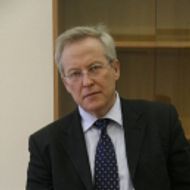- A
- A
- A
- ABC
- ABC
- ABC
- А
- А
- А
- А
- А
- HSE University
- Faculties
- Faculty of World Economy and International Affairs
- School of World Economy
- News
- A new take on competition in the banking sector in the light of international banking regulation reform
-
The School
17/1 Malaya Ordynka Str., Moscow, 119017
Phone: +7(495)772-95-90*22237
Email: wec@hse.ru
 The Multilateralism of the New Development Bank on the Sustainable Economic Growth in BRICS Nations and Beyond
The Multilateralism of the New Development Bank on the Sustainable Economic Growth in BRICS Nations and Beyond
Morozkina A., Grigoryev L. M., Gaspardo M. et al.
Emerald Group Publishing Ltd., 2025.
Frontiers in Political Science. 2025. Vol. 7.
Leonid Grigoryev, Morozkina A.
In bk.: The Multilateralism of the New Development Bank on the Sustainable Economic Growth in BRICS Nations and Beyond. Emerald Group Publishing Ltd., 2025. Ch. 6. P. 83-101.
Yakovlev A. A., Freinkman L., Ershova N. V. et al.
QoG Working Paper Series. 2023:19. University of Gothenburg, 2023. No. 19.

A new take on competition in the banking sector in the light of international banking regulation reform
During the conferenceEduard Dzhagityan, Associate Professor, School of World Economy, HSE, spoke at the session highlighting key aspects and challenges of the post-crisis financial regulation with focus on whether banking competition could be included into international banking regulation system. His report titled: “Banking regulation and competition: In search of valid linkages in the light of international banking regulation reform” is the first ever research attempting to understand interrelationship between the extent and dynamics of banking competition and the contemporary model of international banking regulation, which is now in progress along with Basel III implementation process. The relevance of this issue stands in line with the international banking regulators’ efforts in maintaining sustainability of the banking sector and financial stability. In this context, lack of understanding of the relationship between competition and financial stability may obstruct proper adaptation of credit institutions to the requirements of the post-crisis specifics of banking regulation and volatile financial markets.
Missing instruments of quantitative assessment of banking competition complicates unbiased evaluation of the banking sector consistency and puts additional pressure on measuring stress-resilience of banks, which inevitably restrains efforts towards financial stability. In case of monopoly banking system, ‘undercompetitive’ environment substantially increases stress burden on banks, thereby exacerbating systemic risks and crisis developments at both micro- and macro-levels. In these circumstances, banks can reclaim their role of driving forces of economic development and growth if and when level playing field will become a lasting environment for all credit institutions. In the meantime, robustness of banking performance can be more objectively evaluated should fair competition in the banking industry is linked with the measures towards financial stability including competition-centered standards of prudential banking supervision.
- About
- About
- Key Figures & Facts
- Sustainability at HSE University
- Faculties & Departments
- International Partnerships
- Faculty & Staff
- HSE Buildings
- HSE University for Persons with Disabilities
- Public Enquiries
- Studies
- Admissions
- Programme Catalogue
- Undergraduate
- Graduate
- Exchange Programmes
- Summer Schools
- Semester in Moscow
- Business Internship
- © HSE University 1993–2025 Contacts Copyright Privacy Policy Site Map
- Edit







